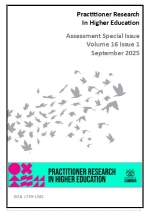A critical reflection on audio feedback for undergraduate students as a care-full and compassionate performance of emotional labour
##plugins.themes.bootstrap3.article.main##
Abstract
This critical reflection, structured using Gibbs’ reflective cycle, focuses on my experience, as a Senior Lecturer in a higher education Institution in the UK, of trialling providing audio summative feedback to undergraduate students for the first time. In this paper, I articulate the worries and anxieties I experienced providing audio feedback, related to the emotional labour required in performing the ‘correct’ tone; saying appropriate words; and creating an appropriate environment and atmosphere for delivering audio feedback. I argue that making visible the emotional labour involved in providing audio feedback has important implications for assisting in elevating the status of audio feedback beyond being considered a mere administrative task. Further, I contend that making this emotional labour visible may enable students to see the compassion that goes into the process of providing ‘care-full’ feedback. This paper concludes with recommendations to support colleagues and students to get the most out of audio feedback.
##plugins.themes.bootstrap3.article.details##
Proposed Policy for Journals That Offer Delayed Open Access
Authors who publish with this journal agree to the following terms:
- Authors retain copyright and grant the journal right of first publication, with the work for one year after publication simultaneously licensed under a Creative Commons Attribution License that allows others to share the work with an acknowledgement of the work's authorship and initial publication in this journal.
- Authors are able to enter into separate, additional contractual arrangements for the non-exclusive distribution of the journal's published version of the work (e.g., post it to an institutional repository or publish it in a book), with an acknowledgement of its initial publication in this journal.
- Authors are permitted and encouraged to post their work online (e.g., in institutional repositories or on their website) prior to and during the submission process, as it can lead to productive exchanges, as well as earlier and greater citation of published work (See The Effect of Open Access).


 https://orcid.org/0000-0002-1564-5472
https://orcid.org/0000-0002-1564-5472